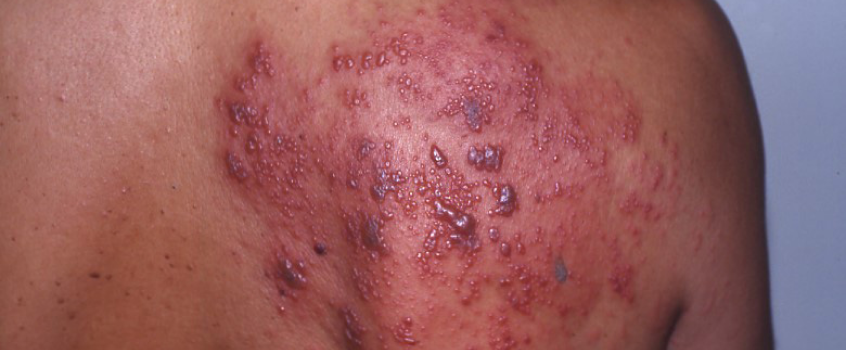Herpes symplex

Herpes simplex is a viral infection causing sores, typically around the mouth (HSV-1) or genitals (HSV-2).
What is it?
Herpes Simplex is a common viral infection caused by the herpes simplex virus (HSV). There are two types of the virus: HSV-1, which primarily causes oral herpes, and HSV-2, which is mainly responsible for genital herpes. However, both types can infect either region. Herpes simplex is highly contagious and can spread through direct contact with an infected person’s skin, saliva, or bodily fluids. The infection remains in the body for life, lying dormant in nerve cells after the initial outbreak.
Herpes simplex infections present as painful sores or blisters that may recur periodically. While there is no cure for herpes, antiviral medications can help manage outbreaks, reduce symptoms, and lower the risk of transmission. In many cases, the virus is asymptomatic, meaning individuals can carry and spread the virus without knowing they are infected. Herpes simplex can be transmitted even when no visible sores or symptoms are present, making it highly contagious.
Signs and Symptoms
The symptoms of herpes simplex vary depending on the location of the infection. Many people infected with HSV may not experience symptoms right away, and the first outbreak is often the most severe. When symptoms do occur, they may include:
Painful Blisters or Sores:
These usually appear in clusters around the lips, face (oral herpes), genital area, anus, or inside the mouth (genital herpes). The sores may rupture and crust over.Itching or Burning Sensation:
Before the appearance of sores, individuals may experience itching or a burning sensation in the affected area.Painful Urination:
For those with genital herpes, pain during urination may occur when sores are present in the genital region.Flu-like Symptoms:
Fever, muscle aches, swollen lymph nodes, and headaches may accompany the first outbreak of herpes.Tingling or Pain:
Many people experience a tingling or painful sensation in the area where the sores will later appear. This is known as prodrome and occurs before an outbreak.Recurrent Outbreaks:
After the initial outbreak, the herpes virus can remain dormant in the nerve cells and reactivate during times of stress, illness, or immune suppression, leading to recurrent outbreaks.
Causes
Herpes simplex infections are caused by the herpes simplex virus, which is highly contagious. The primary causes include:
Direct Skin-to-Skin Contact:
HSV spreads through direct skin-to-skin contact with an infected person, such as kissing, touching, or engaging in sexual activity with someone who has the virus.Oral and Genital Contact:
Oral herpes (HSV-1) can be transmitted through kissing or oral sex, while genital herpes (HSV-2) is commonly spread through vaginal, anal, or oral sex.Contact with Contaminated Surfaces:
Herpes can also spread indirectly if a person touches a surface that has the virus on it, such as towels, razors, or bedding, and then touches their mouth, eyes, or genitals.Asymptomatic Spread:
Even when an infected person has no visible sores or symptoms, the virus can still be transmitted through asymptomatic shedding, making it possible for the virus to spread without anyone being aware.
Several factors can trigger the reactivation of the herpes simplex virus, including:
Stress:
Physical or emotional stress can lower immune function, leading to the reactivation of the virus.
Illness or Fever:
Any illness that weakens the immune system or causes a fever can trigger a herpes outbreak.
Hormonal Changes:
Fluctuations in hormones such as during menstruation or pregnancy, can increase the likelihood of a herpes outbreak.
Weakened Immune System:
Conditions that suppress the immune system, such as HIV, cancer treatments, or organ transplants, may lead to more frequent outbreaks of herpes.
Stress:
Physical or emotional stress can lower immune function, leading to the reactivation of the virus.
Illness or Fever:
Any illness that weakens the immune system or causes a fever can trigger a herpes outbreak.
Hormonal Changes:
Fluctuations in hormones such as during menstruation or pregnancy, can increase the likelihood of a herpes outbreak.
Weakened Immune System:
Conditions that suppress the immune system, such as HIV, cancer treatments, or organ transplants, may lead to more frequent outbreaks of herpes.
Why One Should Not Take Patent Homeopathic Medicine
Herpes simplex is a recurring viral infection that requires a personalized and comprehensive treatment approach. Patent homeopathic medicines, sold as "one-size-fits-all" remedies, may provide temporary relief but do not effectively address the complexity of the herpes virus or its recurrence patterns. These over-the-counter treatments are not tailored to the individual's constitution or the specific strain of the virus involved.
Furthermore, patent homeopathic remedies often fail to consider important factors such as the immune system status, lifestyle habits, and stress factors that contribute to the virus’s reactivation. Without addressing these underlying causes, patent medicines may offer short-term symptom relief while the virus continues to persist and cause future outbreaks. A proper homeopathic approach to treating herpes simplex requires a professional assessment to ensure the most suitable remedy for long-term resolution.
Benefits of Homeopathy in Treating Herpes Simplex
Homeopathy offers a unique and holistic approach to managing herpes simplex infections, targeting both the virus and the body’s immune response. Instead of simply suppressing symptoms, homeopathy works by addressing the root cause of the recurrence and helping the body regain balance.
One of the primary benefits of homeopathy is its individualized treatment, which considers the patient’s overall health, constitutional makeup, and lifestyle factors. This personalized approach ensures that the remedy selected is the most appropriate for the patient, leading to better results and fewer recurrent outbreaks.
TheHomeoSaga provides expert homeopathic treatment for herpes simplex, offering tailored remedies that focus on both the physical and emotional aspects of the condition. With personalized consultations and a holistic approach, TheHomeoSaga helps patients manage herpes simplex effectively and achieve better quality of life.
